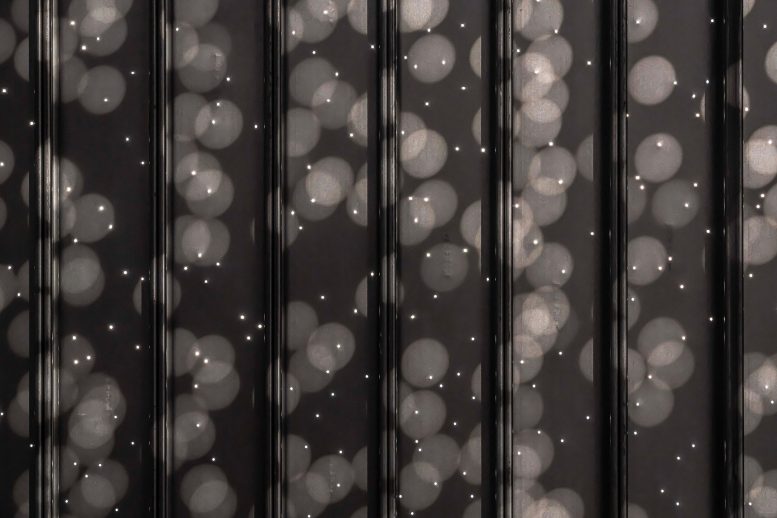
This image offers an abstract visual representation of graphene oxide sheets (black layers) embedded with nanodiamonds (bright white points). The nanodiamonds exert long range electrostatic forces (nebulous white circles) which stabilize the sheets even in humid conditions creating a promising membrane material for hydrogen purification. Credit: Yasuhiro Chida (Brocken 5) and Toru Tsuji (Photograph)
Nanodiamonds may be tiny, but they can help with one of the biggest problems facing humanity today: Climate change.
Hydrogen, a clean-burning fuel, leaves nothing but water when consumed. Many countries view hydrogen as a way to a zero-carbon future, but switching to a hydrogen economy requires its production to be much more affordable than it is now.
In a study published in Nature Energy recently, researchers led by Kyoto University’s Institute for Integrated Cell-Material Sciences (iCeMS) describe how nanodiamond-reinforced composite membranes can purify hydrogen from its humid mixtures, making the hydrogen generation processes vastly more efficient and cost-effective.
“There are several scalable methodologies to produce hydrogen, but hydrogen generally comes as humid mixtures and their purification is a challenge,” says Professor Easan Sivaniah, who led the iCeMS team. “Membrane technology allows for energy-efficient and economical separation processes. But we need to have the right membrane materials to make it work,” Sivaniah added.
Graphene oxide (GO), a water-soluble derivative of graphite, can be assembled to form a membrane that can be used for hydrogen purification. Hydrogen gas easily passes through these filters, while larger molecules get stuck.
Hydrogen is typically separated from CO2 or O2 in very humid conditions. GO sheets are negatively charged, which causes them to repel each other. When exposed to humidity, the negatively charged sheets repel each other even more, allowing water molecules to accumulate in the spaces between the GO sheets, which eventually dissolves the membrane.
Dr. Behnam Ghalei, who co-supervised the research, explained that adding nanodiamonds to the GO sheets resolves the humidity-induced disintegration problem. “Positively charged nanodiamonds can cancel out the membrane’s negative repulsions, making the GO sheets more compact and water-resistant.”
The team also included other research groups from Japan and abroad. The researchers at Japan Synchrotron Radiation Research Institute (